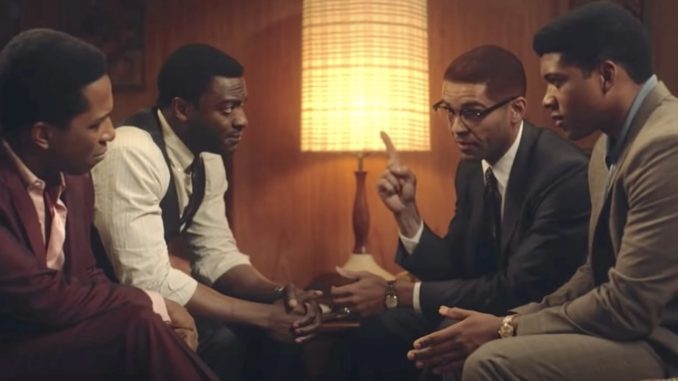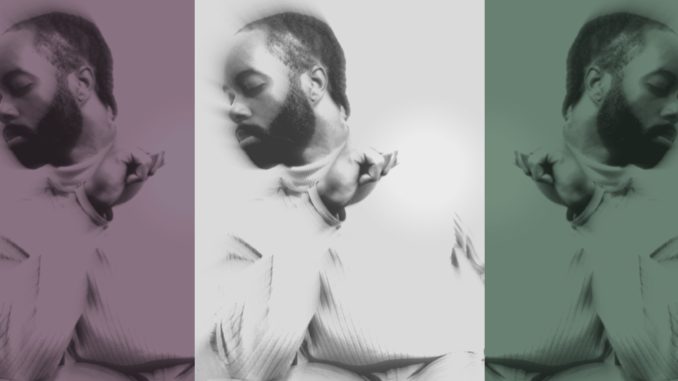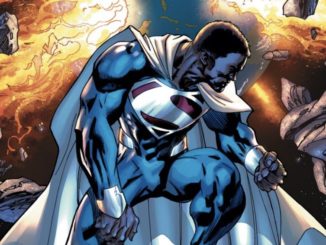
Must watch. Those are the very words that come to mind when referring to the undeniably brilliant film “One Night In Miami.” No cap, Regina King’s directorial debut is genius in all aspects, including the valiant casting and masterful acting. Staging an entire story with so much depth in one setting is challenging enough. Yet, even with the confines of a four-wall motel room, King and the cast — consisting of Kingsley Ben-Adir, Eli Goree, Aldis Hodge and Leslie Odom Jr. — are able to deliver veracious performances that focuses primarily on quality over quantity.
It would be remiss to not point out the fiery standout performance of Ben-Adir, who embodies the very essence of activist Malcolm X. While his initial portrayal presented him as the affable confidante to boxer Cassius Clay (Goree), also known as Muhammed Ali, with a searing burden on his back, as Ben-Adir’s character evolves, surprisingly so do the range of invested emotion that channels away from the stereotypical incandescent image and verbiage that has so often represented Malcolm X throughout history to a more humanizing existence — in a vulnerable moment, he sheds tears over the constant struggle to convince Black people of their worth and purpose.
Case in point, there’s a dynamic scene in which Malcolm X and Sam Cooke (Odom Jr.) clash in ideologies on how they each contribute to the cause of liberating the Black community. The degrees of emotion begin with a subtle suggestion that progresses into a full-on verbal warfare, before easing into empathetic discourse that eventually balances the scales. While Malcolm X is usually penned as the antagonist because of his austere presence and strong views, Odom Jr.’s delivery was so thoroughly believable that it appears that Cooke was the actual conflicted opponent during that historic meeting.
From his dismissiveness of realities surrounding the civil rights movement to his overwhelmingly eager desire to assimilate to a society that has historically rejected his kind, Cooke’s presence revealed a few things — one, all Black people don’t think alike or what the intellectuals like to say “aren’t monolithic” (but, we should all know this by now); two, some Black people fight the good fight behind the scenes; three, the struggle is constant also for the rich Black person who has branched off into the overpromising side of mainstream because even if they are not physically bounded by the oppression of the south, there’s still the issue of oppression of the mind.
Malcolm X and Sam Cooke’s conversation permeates beyond the television screen, planting provocative seeds in the mind of the viewer that sparks the brain to not only consider whether life has been expended to reach outside of one’s own personal ambitions, but also to consider doing something that will be more impactful to the greater good. As Malcolm X so eloquently pointed out, no matter what profession someone has — from the doorman to the championed athletes in the room — everyone can utilize their platform to contribute to the cause.
Amid the philosophical war waging between Malcolm X and Cooke, the more even keel Cassius Clay and Jim Brown, both respected athletes who have been outspoken about race relations in their careers, insert calculated temperaments that neither sway too far left or right on the pendulum — at least that was the case during the meeting. That’s even with Cassius Clay proclaiming that he would be joining the Nation of Islam and with Jim Brown receiving first-hand experience with racism.
With that said, the two men added to the overtly powerful dynamic, which today would probably look like Jay-Z, LeBron James, Patrick Mahomes, and perhaps a Phillip Agnew, Van Jones or Colin Kaepernick (by the way, it is very hard to find modern-day Black men who are alive and have far-reaching platforms that have effectively stepped into the shoes of Malcolm X or Martin Luther King Jr., but that’s a whole different discussion).
An insurmountable amount of praise is due to the director and cast of the pic, however the scribe behind the screenplay Kemp Powers deserves adulation for his fearless refusal to avoid important discussions that plague the Black community, such as the ongoing division between shades of Black, the struggle of the mixed, biracial or lighter skin brethren to unapologetically stand for their blackness despite being rejected by Black people, or the whole question of selling out.
Powers maintains a certain dignity to the dialogue that leaves the viewer receptive to all points of views until finally, at the end of the pic, a choice has to be made. It’s the most subtle seduction of the mind that somehow captivates using the bare minimum of bells and whistles.
Although there’s no sex, violence, or drugs, One Night In Miami offers an experience that is a true theoretical and philosophical rollercoaster for the viewer who understands the importance of this dialogue in the 1960s, when Black activism heightened in support of the civil rights movement, up until 2021, where the conversation surrounding systemic racism and social inequality still persists.
The MouthSoap highly recommends this film for the discourse and debate! One Night In Miami is currently available on Amazon Prime.



